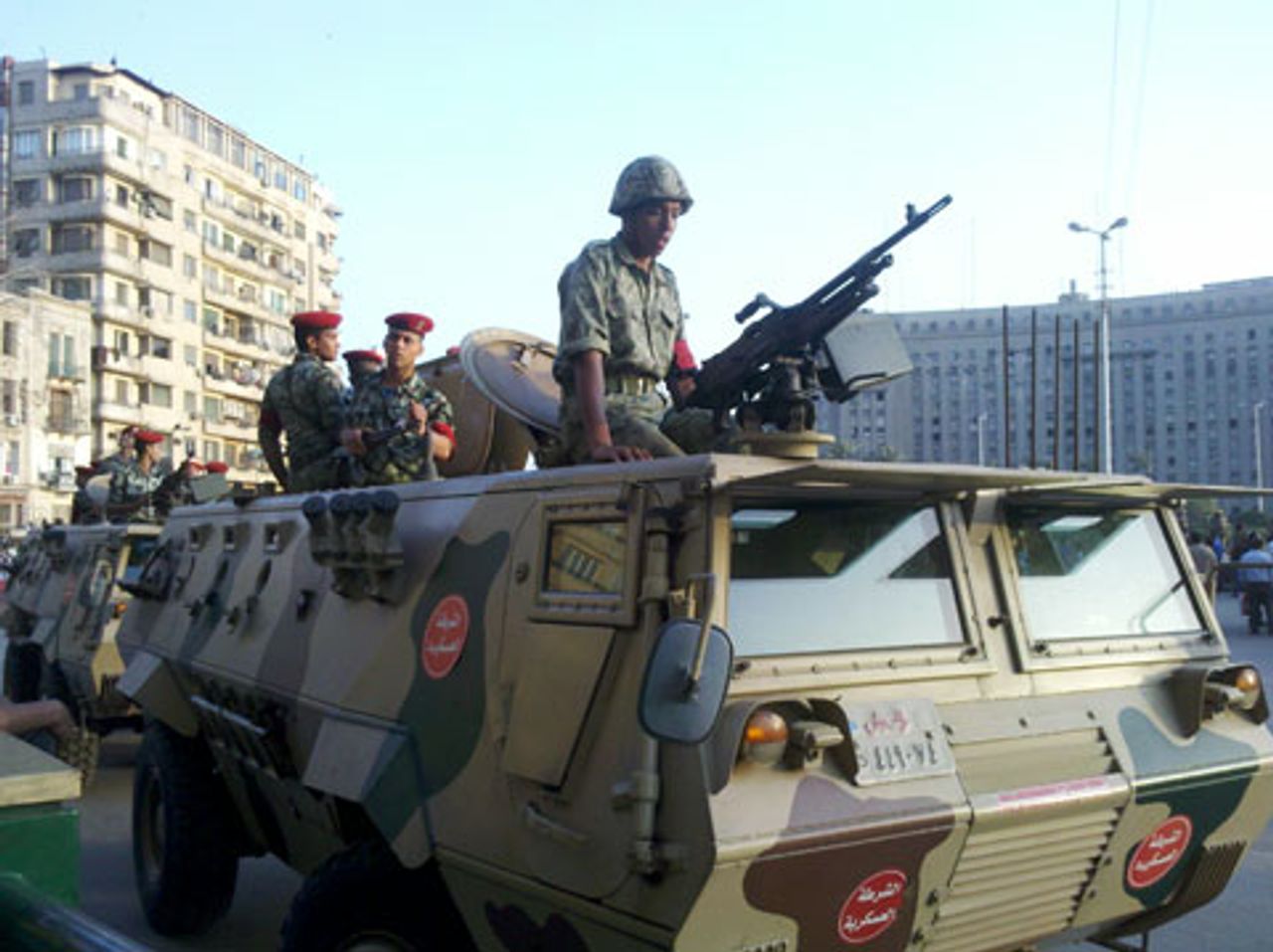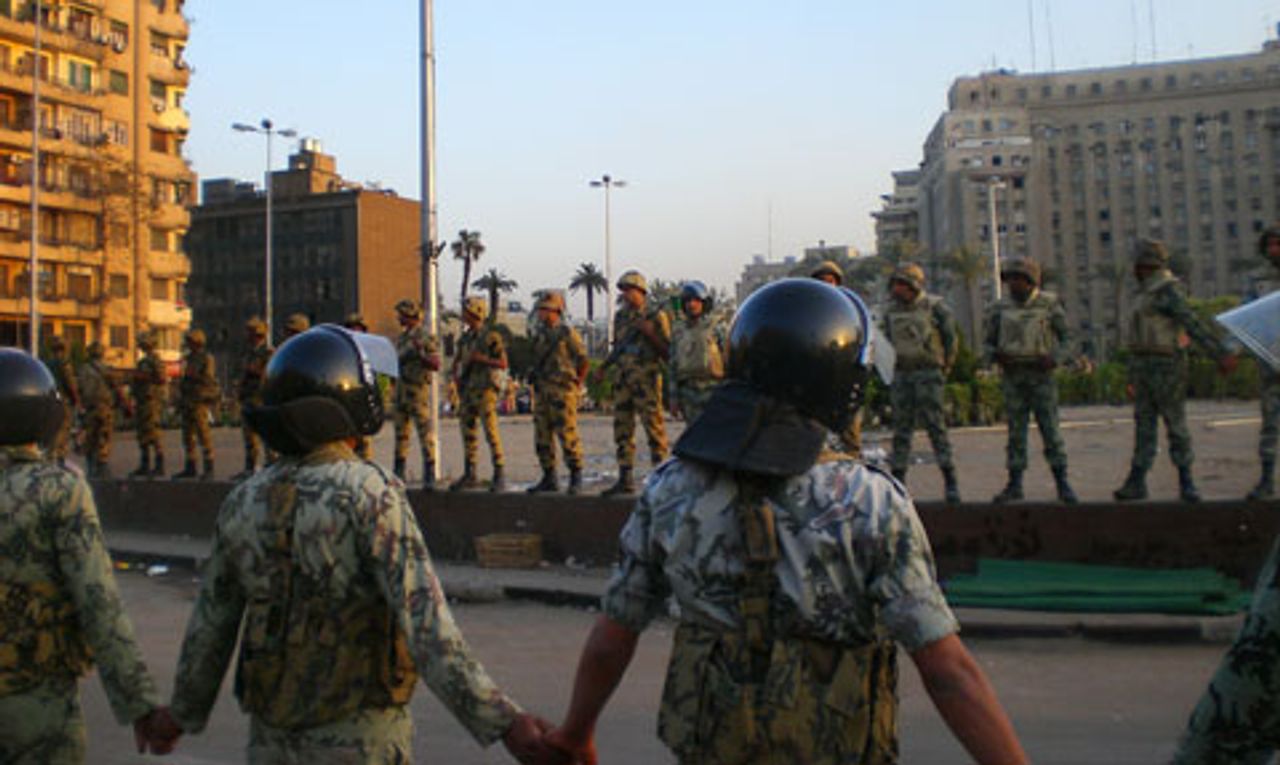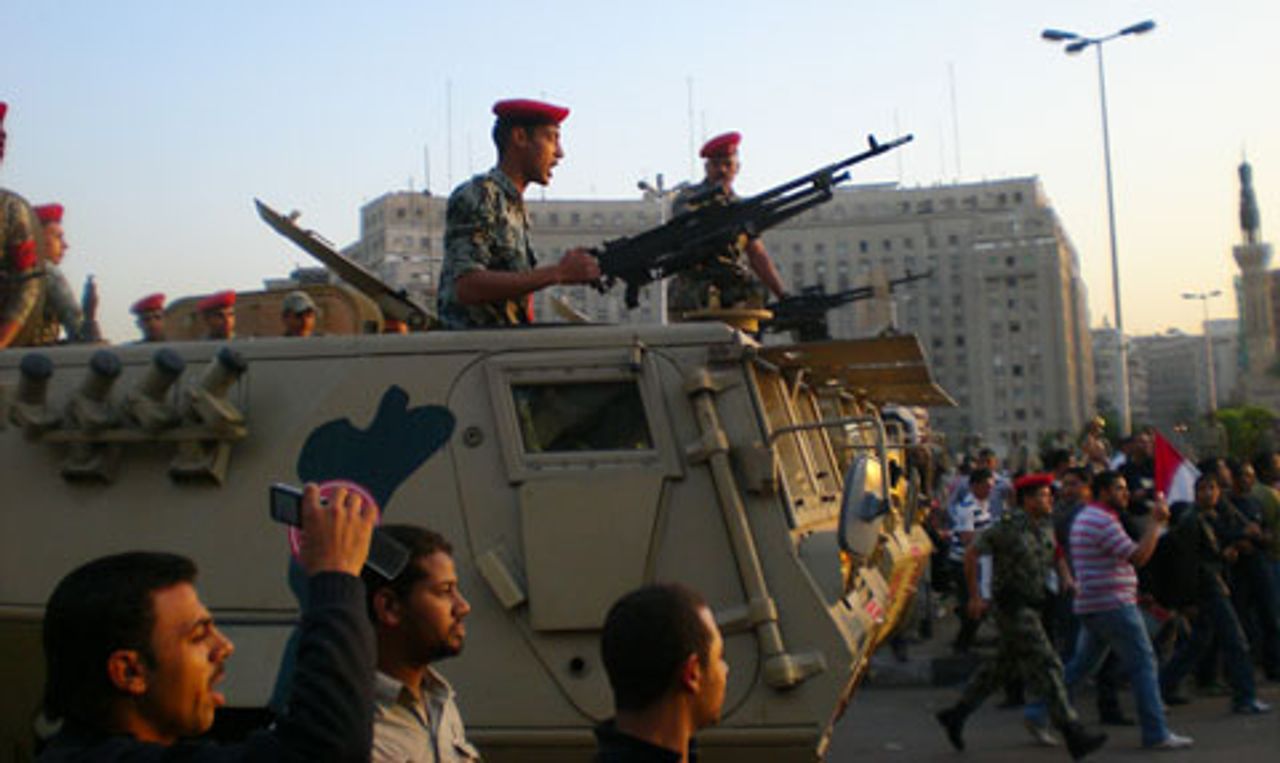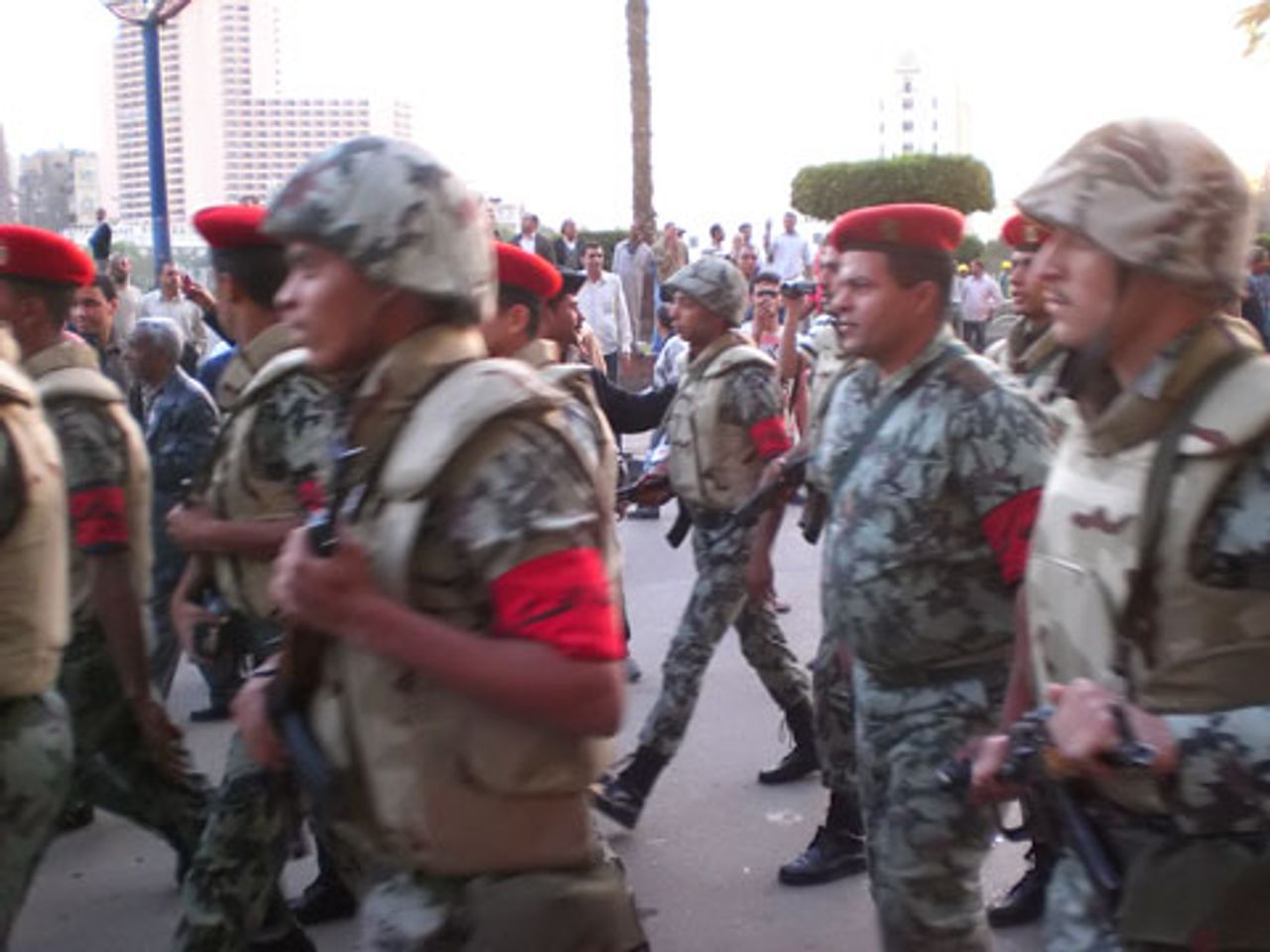On Tuesday, the Egyptian military once again stormed Tahrir Square and violently dispersed a peaceful sit-in by demonstrators. At 17:00, the military drove onto the square with armoured vehicles, forcing protesters from the centre, and then occupied the area with heavily armed soldiers.
 Troops advance on Tahrir Square
Troops advance on Tahrir SquareThe military then proceeded to hunt down demonstrators and activists who had fled into downtown Cairo, carrying out numerous arrests. Among the special forces used in the attack was the notorious Unit 777, an "anti-terrorist" unit that regularly exercises with US units such as the Delta Force. The special forces stormed houses in downtown Cairo and combed cafes for protesters and activists.
The military had already begun to brutally clear demonstrators from Tahrir Square on Saturday morning, employing stun guns, batons and also live ammunition. Eye witnesses told the World Socialist Web Site that soldiers had fired directly at protesters and seven people had been killed. One of the victims was a young officer who had sided with protesters during mass protests on Friday.
Despite the deadly assault, the military were unable to vacate the square. The protesters refused to back down and barricaded themselves against the army and security forces.
 Egyptian military
Egyptian militaryImages of the confrontations recalled the early days of the revolution, when protesters sought to protect themselves against the thugs of the regime by erecting barbed wire and barricades. The difference this time is that the aggressors came directly from the Egyptian military, which at the start of the demonstrations had merely looked on. That was the case, for example, on February 2, when goons from the Mubarak regime attacked thousands of peaceful demonstrators in Tahrir Square. The army then did not lift a finger to prevent the massacre.
Following the attacks on Saturday and Tuesday, the Military Council and state television declared that the protesters remaining in Tahrir Square were hired thugs of the old regime seeking to drive a wedge between the army and the population. This odious propaganda lie has been supported by almost all official political parties, including the presidential candidate Mohamed El Baradei and the Muslim Brotherhood. All of these forces insist that confidence in the army is a “red line” which must not be crossed. The unity of the nation must not be endangered and the army is on the side of the revolution, they maintain.
 The military lined up against protesters at Tahrir Square
The military lined up against protesters at Tahrir SquareThe unconditional support of the Egyptian bourgeoisie for the military junta after weeks of deadly violence by the military speaks volumes about the real nature of these self-proclaimed democratic forces.
On Sunday, the Egyptian blogger Mikael Nabil was sentenced by a military court to three years in prison. Nabil had demonstrated in an article that the military had never been on the side of the revolution, but had rather arrested and tortured protesters before putting them before military courts. None of the self-appointed “democrats” has criticised his conviction and transfer to the notorious Tora prison.
The efforts of the junta to end the revolution by force have the full support of almost all of the most influential representatives of the Egyptian bourgeoisie. The official opposition parties and groups such as El Baradei’s National Alliance for Change, the Muslim Brotherhood, the bourgeois and pseudo-left parties such as al-Tagammu do not represent the interests of the protesting workers and young people, but rather sections of the ruling elite that see their interests threatened by the revolution in which the working class is increasingly emerging as the driving force.
 The military advances on foot at Tahrir Square
The military advances on foot at Tahrir SquareLast Friday, workers from the industrial centres of the country descended on Tahrir Square to demand a minimum wage, limits on top salaries, and the re-nationalisation of privatised companies. Then on Tuesday, on the same day as the latest state violence in Tahrir Square, a new wave of strikes spread across the country, with workers in various sectors of industry demanding higher wages and better working conditions.
According to a report in Al Masry Al Youm, 350 workers protested outside the Ministry of Social Affairs in Talkha, a town in Daqahlia province in the Nile Delta.
In Cairo, 200 workers marched to the tax authority office, demanding their salaries and the payment of bonuses. Another protest was held outside the office of the minister of justice.
In Alexandria, teachers demonstrated outside the Education Ministry and demanded permanent employment contracts.
In Gharbiya, 1,200 workers from the Financial and Industrial Company protested for higher wages.
In Menoufiya, 350 workers from the Chipsy Company demonstrated for higher salaries.
Also on Tuesday, textile workers held protests in the Nile Delta.
Mobilisations also took place in the south of the country. In Assiut, workers from the Spinning and Weaving Factory protested against the takeover of the factory by a new buyer, a conglomerate of private banks. The deal had been organised by the former prime minister of the Mubarak regime, Ahmed Nazif.
Another protest occurred in the province of Ismailiya, where residents of the Mahsama village demonstrated against the closure of a bakery that supplies the 1,500 local inhabitants with bread.
The strike by Suez Canal workers continued. Thousands of workers from six companies connected to the Suez Canal Authority have been on strike since April 3, calling for higher wages, better health care and higher pensions. The offices of the company are situated in Suez, Port Said and Ismailiya. Workers have threatened to move their protest to the headquarters of the Suez Canal Authority and begin a hunger strike if their demands are not met.
The non-ending stream of strikes and protests by Egyptian workers has unnerved the military junta and its Western supporters. Above all, the strike by the Suez Canal workers directly threatens the strategic and economic interests of imperialism in the region.
On Tuesday, Essam Sharaf, who was installed by the military as the country’s prime minister, ordered the chairman of the Suez Canal Authority, Admiral Ahmed Fadel, to put an end to the crisis at the canal. In light of the recent violence used against protesters, this can only be understood as a threat. The regime is preparing to end the strike with the use of massive force.
This policy has the full support of the major imperialist powers and the international financial markets. Western politicians have largely sought to avoid any criticism of the violence carried out by the military dictatorship in Egypt. For such forces, the Egyptian military guarantees the defence of capitalism in the region.
A report published recently by Barclays with the ominous title “Point of No Return,” which was dealt with in the Egyptian daily Al Ahram, reveals the real thinking of the representatives of international capital with regard to the economic situation in Egypt. One problem identified in the report is that the ongoing strike wave is primarily responsible for a decline in the productivity of Egyptian factories. A second problem is that concessions made to workers’ protests has led to higher wages. While this may be “good for workers,” it is a blow to “competitiveness,” the British bank wrote.
One reason for optimism, according to the report, is the ruling military council. Barclays praises the junta for ensuring “an orderly transition to democratic rule” and taking the “necessary” measures to “reduce uncertainties and provide clarity with regard to medium-term prospects.”
The only criticism directed towards the Military Council in the report is the decision to re-examine some of the contracts with foreign investors concluded under the Mubarak regime. This, the report concludes, sends the wrong signals regarding the future course of the Egyptian economy, despite all the declarations made in favour of a free market economy.
The report by Barclays makes clear what the international banks expect from the new Egyptian military dictatorship—the brutal repression of the Egyptian working class and a continuation of the neo-liberal policies carried out under Mubarak. The events of recent days and weeks have shown that the Military Council, led by Field Marshal Mohammed Hussein Tantawi, are more than willing to comply with the demands of big business and the banks.
